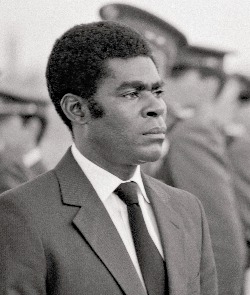 The Republic of Equatorial Guinea (or "Equatorial Guinea" for short) is one of the smallest and least populated countries in Africa today with a total land area of just 28,051 squared kilometers. This total land area consists of a mainland territory and five inhabited islands. The mainland territory (also known as "Rio Muni") is bordered by the Republic of Cameroon to the north and the Republic of Gabon to the south and east.
The Republic of Equatorial Guinea (or "Equatorial Guinea" for short) is one of the smallest and least populated countries in Africa today with a total land area of just 28,051 squared kilometers. This total land area consists of a mainland territory and five inhabited islands. The mainland territory (also known as "Rio Muni") is bordered by the Republic of Cameroon to the north and the Republic of Gabon to the south and east.
The capital of Equatorial Guinea, Malabo, is located on the island of Bioko which is approximately 25km from the Cameroonian coastline in the Gulf of Guinea. Just about 4.3% of Equatorial Guinea's total land area remains arable (land good for farming).
The Republic of Equatorial Guinea has an estimated population of 1.5 million people with the population growth rate hovering around 2.3%. There are 8 administrative divisions or provinces in Equatorial Guinea -- Annobon, Bioko Norte, Bioko Sur, Centro Sur, Djibloho, Kie-Ntem, Litoral and Wele-Nzas.
The Republic of Equatorial Guinea is mostly urban with about 74% of its population living in urban areas. The remaining fraction of the population lives in rural and sub-urban communities mostly as subsistence farmers who grow crops and rear animals just to feed themselves and their families. Malabo, a port city and capital of Equatorial Guinea, is home to about 300,000 people. The second, third, and fourth largest cities, Niefang, Ebebiyin, and Santiago de Baney, are home to about 45,000, 40,000, and 31,000 people respectively.
The Republic of Equatorial Guinea is the only spanish-speaking country in Africa. Equatorial Guinea gained independence (from Spain) on October 12, 1968 after 190 years of Spanish rule. Spanish is the main official language of Equatorial Guinea spoken by about 67% of the population. French (official), Portuguese (official), Fang, Bubi, and Portuguese-based creole are some of the other languages spoken in Equatorial Guinea today.
Just like its neighboring countries, the Republic of Equatorial Guinea is blessed with abundance of natural resources including petroleum, natural gas, timber, gold, bauxite, diamonds, tantalum, clay, sand and gravel. However, despite the abundance of both natural and human resources, the Republic of Equatorial Guinea, like its neighboring countries, faces several developmental and social challenges.
Teodoro Obiang Nguema Mbasogo, the president of Equatorial Guinea, has been in power since overthrowing his uncle in a coup in 1979. He is a dictator and one of the worst leaders in Africa today. In fact, he is the longest reigning non-royal in the world and plans to go to his grave with that title. Not just that, he promoted his son, Teodoro Nguema Obiang Mangue (popularly known as "Teodorin Obiang"), to the position of vice president in 2012 and he remains the vice president. In other words, his son Teodorin Obiang is all set to take over after the death of his father. Teodorin Obiang isn't just the vice president of Equatorial Guinea, he is also the second-richest person (after his father) in the country. Teodorin Obiang owns a large fleet of supercars and several luxurious mansions around the world.
Equatorial Guinea's economy mostly depended on cash crops like cocoa and coffee before oil discoveries in the 1980s and its further exploitation. Equatorial Guinea is now a very significant oil (petroleum) producer in Africa. In fact, Equatorial Guinea's entire economy now depends heavily on oil exports. However, according the International Monetary Fund (IMF) and some other analysts, oil reserves in Equatorial Guinea are expected to run dry by 2035.
Taking the huge oil revenues and its smaller population size into consideration, one would expect the Republic of Equatorial Guinea to be among the richest countries in the world today. That is exactly the picture Teodoro Obiang and his son try to push out to the rest of the world. According to government figures, Equatorial Guinea has one of the highest literacy rates and GDP per capita income on the African continent.
Equatorial Guinea's literacy rate for the general population is around 95.3%. This would mean that, at least 95.3% of Equatorial Guineans (or Equatoguineans) above age 15 can read and write. Also, Equatorial Guinea's Gross Domestic Product per capitat (GDP per capita) in 2008 was $22,942.66. In comparison, China's GDP per capita in 2008 was $3,468.30, South Africa's GDP per capita was $5,760.81, Russia's GDP per capita was $11,635.27 and South Korea's was $21,350.43.
Equatorial Guinea had that high GDP per capita income in 2008 mostly because of the huge oil revenues that came in that year. As most of you know, GDP per capita measures the economic output of a nation per person. In other words, Equatorial Guinea's total economic output in 2008 divided by its population size at that time was $22,942.66. All things being equal, the yearly income of every Equatorial Guinean in 2008 should have been about twice that of every Russian, and about 4 times that of every South African.
The sad reality however is that, over 70% of Equatorial Guinea's population lives in poverty with at least 50% living in extreme poverty. Not just that, some human, sex, and drug traffickers are taking advantage of Equatorial Guinea's broken system to exploit women and children both locally and internationally.
